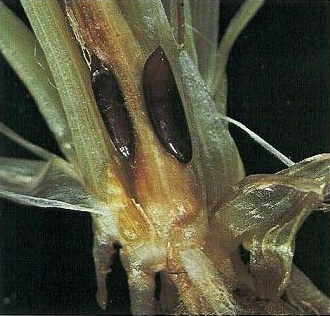HESSIAN FLY
Mayetiola destructor, Cecidomyiidas, Diptera, Insecta
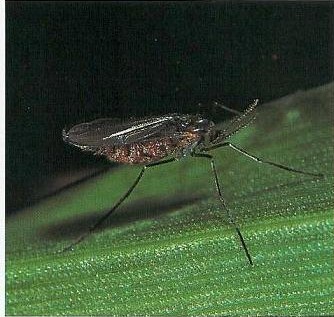
MORPHOLOGY
Adult - The adult Hessian fly is a small, dark, long-legged, two-winged insect which resembles a mosquito. The female fly, about 4 mm long, has a distinct reddish tinge. The brown or black male is 2.5 to 3.5 mm long and bears two pairs of abdominal claspers.
Egg - The thin, cylindrical egg is 0.4 to 0.5 mm long. Although uniformly glossy red when laid, it gradually becomes deeper red at one end and opaque white at the other.
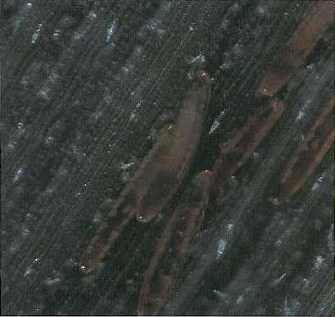
Larva - The newly hatched maggot is red for 4 or 5 days after which it turns white. As the larva matures, a translucent green stripe appears down the middle of its back. The full grown maggot is 3.5 to 5.5 mm long and about 1 mm wide.
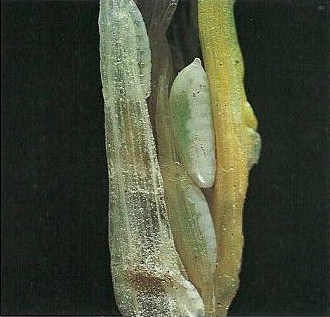
Pupa - The brown-headed pupa is basically white with a reddish tinge. The puparium or "flaxseed" within which the pupa is found is spindle-shaped, red to dark brown, and 2.5 to 6.2 mm in length.
DISTRIBUTION
The Hessian fly was introduced into North America from Europe in the 1700s. In the United States, it can be found from Nebraska to the Atlantic, from Maine into the Piedmont areas of North Carolina, South Carolina, and Georgia, and in isolated areas west of the Rockies. In the past 20 years severe losses have been reported in Washington, Texas, Nebraska, Kansas, and Indiana.
HOSTS
Wheat is the principle host plant of the Hessian fly. It may also be found on rye, barley and other wheat related species.
DAMAGE
In the midwest, Hessian flies are one of the most destructive pests of wheat. The maggots parasite between the leaf sheath and the stem and extract juices from the plant. Fall-infested wheat usually dies during the winter. Spring-infested wheat produces grain but usually lodges before harvest. Economic infestations are uncommon in North Carolina largely due to proper planting date selection.
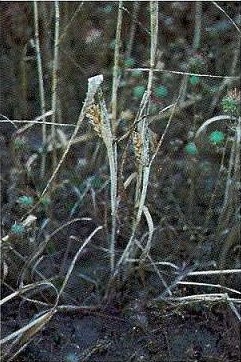
Hessianfly_damaged_plants
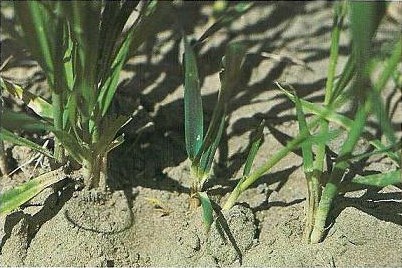
Hessianfly_damaged_seedling
LIFE CYCLES
In the Northern plane area, the Hessian fly complete two generations per year, a spring brood and a fall brood. In the Southern part of the country, as many as six generations a year have been reported. The pupae overwinter within puparia, the hardened skins of the last instar larvae. These puparia, known as the "flaxseed" stage, are located just below the surface near the crown of the plant. In spring (from March in Georgia and South Carolina to May in Michigan) the flies emerge from the flaxseed stage, deposit eggs on wheat, and die in 2 or 3 days. Maggots hatch from the eggs in 3 to 7 days, crawl down the leaves, and feed at the crown or joints along the stem. The maggots develop through three instars over a 25 to 30 day period, enter the flaxseed stage before harvest, and pass the summer in the stubble. In late August or September, second generation flies emerge and deposit eggs on volunteer wheat or early-sown winter wheat. Of the six or more Hessian fly races (biotypes) known to exist, two or more are likely to occur in any area where wheat is grown.
MANAGEMENT
Host plant resistance is the most effective and cost efficient way to control this pest. Thirty resistance genes have been identified and many of them have been incorporated into wheat varieties. State agricultural extension service centers can provide the names of wheat varieties resistant to the particular races of the Hessian fly. Other control measures include "fly free planting”. Wheat planted after this date should escape infestation.
